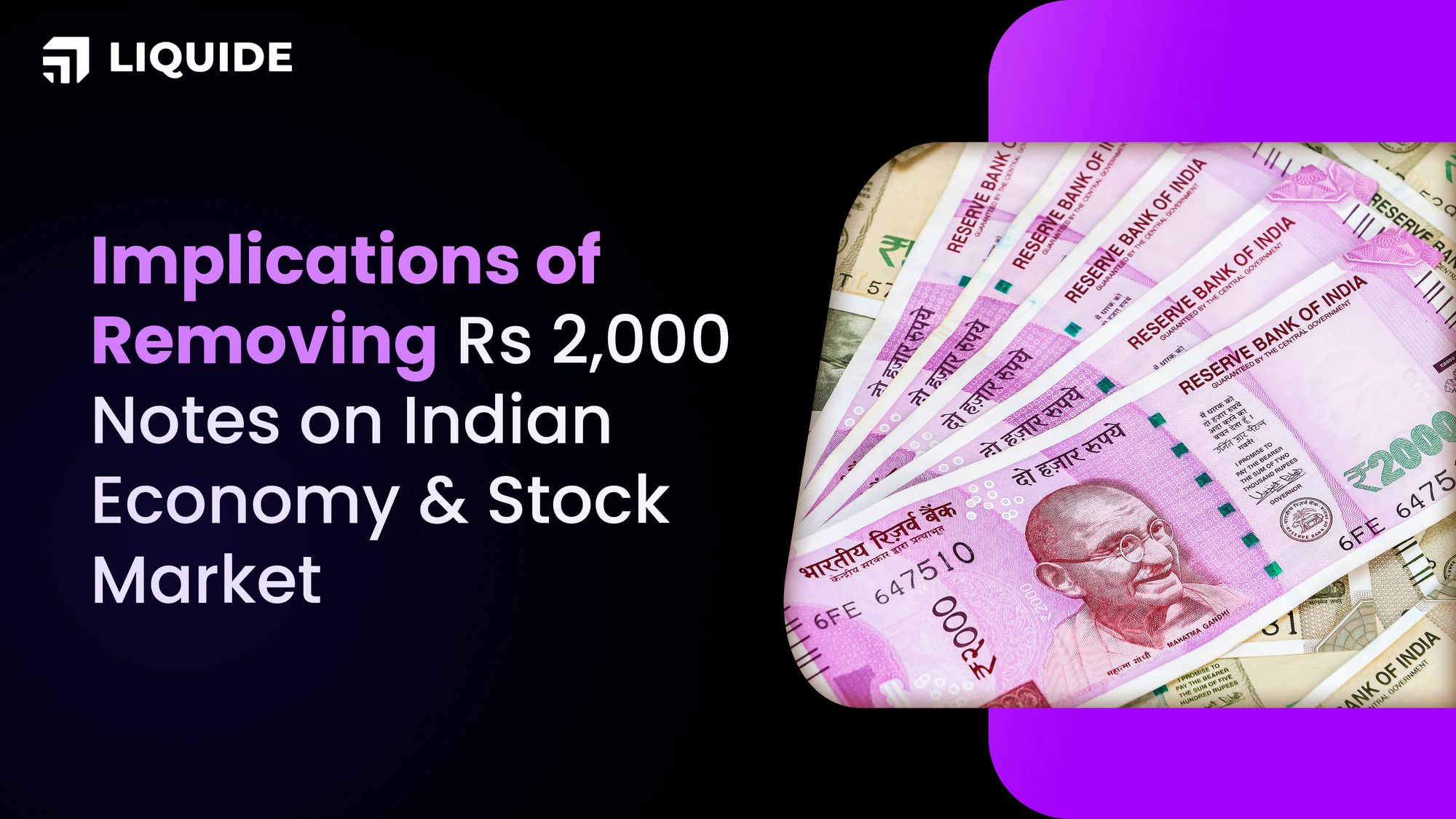Navigating the Impact of Rs 2,000 Note Withdrawal on the Indian Economy and Stock Market
Unravel RBI's surprising withdrawal of Rs 2,000 notes and its impacts on India's economy, stock market, banking sector and various industries.

In a surprising move, the RBI last Friday decided to withdraw the Rs 2,000 banknotes from the market with immediate effect. Notably, these notes constituted ~89% of the total that were issued prior to March 2017. This withdrawal is significant considering the value of these banknotes in circulation has substantially declined from its peak in March 2018.
The total value of these banknotes in circulation has declined from Rs 6.73 lakh crore at its peak as of March 2018 (37.3% of notes in circulation) to Rs 3.62 lakh crore, constituting only 10.8% of notes in circulation as of March 2023.
Why The Decision To Retract Rs 2,000 Notes?
The central bank initiated the Rs 2,000 note to bolster the currency notes in circulation, following Prime Minister Narendra Modi's monumental decision in 2016 to demonetise the Rs 500 and Rs 1,000 notes. However, there has been a marked shift to digital transactions, leading to a decrease in the need for such high-denomination currency. Moreover, the banknote was often hoarded and there were reports of high-quality counterfeits in circulation.
The Rs 2,000 Withdrawal vs 2016 Demonetisation
This RBI action has sparked many to draw comparisons with the 2016 demonetisation, which saw 86% of India's currency being invalidated overnight. However, the recent move has a significantly less drastic impact, with people still being able to use Rs 2,000 notes for transactions and receive them in payment, although they are encouraged to exchange these notes by 30 September 2023.
A Quick Guide On How You Can Exchange Your Rs 2,000 Notes
The exchange facility is provided free of cost and is available at all banks and the 19 Regional Offices of RBI that have Issue Departments. Individuals can deposit the Rs 2,000 notes into their bank accounts without any requisition form or identity proof as long as they comply with the existing Know Your Customer (KYC) norms and other applicable statutory and regulatory requirements.
The RBI has set a limit of exchanging Rs 20,000 at a time, which means that individuals can exchange up to 10 Rs 2,000 notes per transaction. It is not necessary to be a customer of a bank to avail of the exchange facility, as non-account holders can also exchange their Rs 2,000 notes at any bank branch, within the prescribed limit.
Assessing The Effect On The Indian Economy And Stock Market
With the increasing adoption of online payment methods, market experts project a negligible impact on the economy this time due to the lesser share of Rs 2,000 notes in circulation as well as the rapid digitalisation of the payment ecosystem in the country. Also, this step is poised to corner black money holders, thereby enhancing tax collections. Hence, it is a positive development for markets as well.
Impact Across Various Industries
This move is set to spark increased consumption of high-value household items, precious metals and even property as consumers are likely to utilise their Rs 2,000 notes. However, it might pose challenges to cash-intensive sectors such as agriculture, construction, small traders and MSMEs. Despite the hesitation of small retailers and manufacturers to accept these notes due to the hassle of exchanging them later, the disruption is unlikely to be prolonged as the notes remain legal tender.
Implications For The Banking Sector And Bond Markets
Bank deposits are likely to surge following the government's directive to exchange or deposit the notes for smaller denominations by September 30. This will result in a reduction in cash in circulation and an improvement in banking system liquidity, thus easing the pressure on deposit rate hikes. The financial system is projected to gain as much as $12.1 billion, driving a rally in rupee and government securities.
As the banking system's liquidity improves and deposits surge, we could see a drop in short-term interest rates as these funds are invested in shorter-term government securities.
Experience a revolutionary approach to investing with Liquide! Discover curated stock picks, AI-powered research reports, and real-time market tracking. With expert hotline support, portfolio health checkups, and market screeners, Liquide empowers you to make informed investment decisions. Partnering with India's most trusted brokers, Liquide ensures secure and seamless trading. Take control of your investments and download the app from the Google Play Store or Apple App Store. Join Liquide today and explore the stock market like never before!

